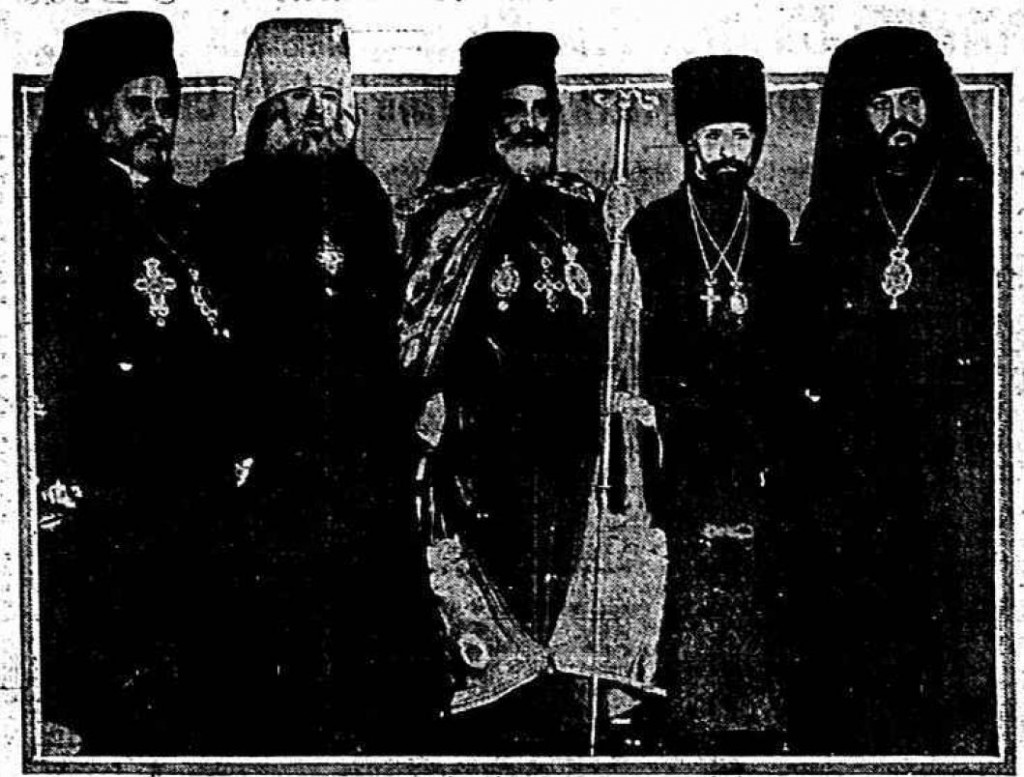
Back in July, Fr. Andrew wrote about the above photo, which depicts a gathering of American Orthodox bishops in the early 1920s: Greeks Meletios and Alexander, Russians Platon and Alexander, and Syrian Aftimios. At the time of Fr. Andrew’s original post, no one knew exactly when this photo was taken, or what occasion brought all these hierarchs together. Fr. Andrew wrote,
This photograph was found in the archives of the Library of Congress. As yet, there have been no official documents that have surfaced detailing what this 1921 meeting must have entailed. It might have been only a courtesy call, with a photo op at the end.
Fr. Andrew went on to observe that, based on the photo, the other bishops appear to have regarded Metaxakis as “first in seniority among them.” To read the rest of Fr. Andrew’s post, click here.
Why am I bringing all this up again? Becasue I believe I now know when and where this photo was taken, and why all these bishops were in the same place. On December 9, 1921, Abp Meletios Metaxakis was elected Patriarch of Constantinople. He was in New York at the time, having been deposed from his previous position as Archbishop of Athens. With Bp Alexander Demoglou, Metaxakis had come to the US to organize the Greek-American churches into a unified archdiocese. The New York Times (12/10/1921) announced that one of Metaxakis’ first acts as Patriarch would be to appoint Alexander as bishop of North and South America.
The Times also reported, “This morning at 10 o’clock the Most Rev. Alexander, Archbishop of the Aleutian Islands and North America for the Russian Church, will formally call upon the Patriarch-elect and officially present the felicitations of the 100,000 Russians who are in the Western Hemisphere, who are his spiritual subjects.”
The Russian goodwill towards Metaxakis’ election was not limited to Abp Alexander Nemolovsky. Archimandrite Patrick Mythen, the powerful convert priest, hastily organized a special ceremony. December 19 was the St. Nicholas day, the patronal feast of the Russian cathedral in New York. Invitations were sent out, in the names of both Met Platon and Abp Alexander. Besides the two Russian and two Greek bishops, the guest list included the Syrian Bp Aftimios and four Episcopalian hierarchs. Representatives of the new African Orthodox Church were also present, as well as the “Hungarian prelate […] Bishop Stephan of Pittsburgh.” I think this was Bp Stephen Dzubay, a former Uniate who converted to Orthodoxy in 1916 and became the Russian Archdiocese’s Bishop of Pittsburgh. (Dzubay returned to Roman Catholicism in 1924.)
After the Divine Liturgy, there was a buffet luncheon for the clergy at the neighboring parish house. The above photo must have been taken during or after this luncheon. Here is another, nearly identical photo, which appeared in the New York Evening Telegram on December 20, 1921:

Comparing the two photos, it’s quite clear that they were taken at the same event, probably within moments of one another. The Evening Telegram photo doesn’t include the non-bishops, Polyzoides and Andronoff, but it’s possible that they were just cropped out before publication.
The event itself, the pan-Orthodox liturgy, is evidence of the rather friendly (or at least cordial) relations between the Greek and Russian hierarchy in 1921. Speaking to the Evening Telegram (12/19/1921), Fr. Patrick Mythen expressed what must have been on the minds of the Russian bishops as well: that Metaxakis’ election as Ecumenical Patriarch marked the first time since the fall of Constantinople that the Patriarch was elected without the consent of the Turkish sultan. He would thus be “politically free and will rule the Church as a priest and not as a politician.” Mythen meant that Metaxakis would not be bound to the Turkish state, but I’m sure many today would find his words ironic, Metaxakis being the controversial Church politican that he was.